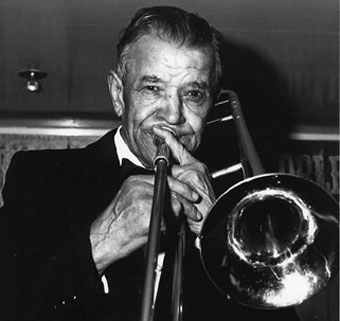Edward Ory, known as Kid Ory, trombone was an American traditional jazz, born in La Place (LA), on December 25, 1886, and died January 23, 1973, in Honolulu (Hawaii).


He began playing with eleven years in a string band, street gangs who used homemade instruments, but in 1911 he formed his Brown Skinned Babies, which included King Oliver (cornet) and Johnny Dodds (clarinet). In 1913, the band includes Papa Mutt Carey on the horn. When Oliver goes to Chicago, was replaced by Louis Armstrong. In 1919 Ory moved to California, where it is a group that in 1922 recorded his famous Creole Ory's trombone. In 1924 he left Los Angeles and the band (whose address takes Mutt Carey), and settled in Chicago, where he recorded with Armstrong and Oliver, Jelly Roll Morton as well. Remains between Chicago and New York until 1930, when he returns to California with Carey. In 1933 he left music to devote himself to agriculture, the care of horses and, later, to work on the railroad.
In the 40's, with the revival of Dixieland, returns to the scene, playing the alto sax, but Orson Welles convinced him to return to the trombone. During the 1950s, became one of the most popular Dixieland Jubilee, making extensive tours of USA and Europe. Open a club in San Francisco, which continues to perform until 1961.
In the 40's, with the revival of Dixieland, returns to the scene, playing the alto sax, but Orson Welles convinced him to return to the trombone. During the 1950s, became one of the most popular Dixieland Jubilee, making extensive tours of USA and Europe. Open a club in San Francisco, which continues to perform until 1961.
For health reasons, he retired to Hawaii in 1966, with appearances and very prompt in jazz festivals and films until his death in 1973. Kid Ory was known as The King of Tailgate, which is just a style trombonist led to its best for him to cover their limited technical capacity to improvise and was characterized by rough language and intense, full and opulent voice, phrasing fast and flowing, full of short glissandos, which serves as a perfect supporting of the collective improvisation of hot own.
Edward Ory, conocido como Kid Ory, fue un trombonista norteamericano de jazz tradicional, nacido en La Place (Luisiana), el 25 de diciembre de 1886, y fallecido el 23 de enero de 1973, en Honolulu (Hawái).

En 1919, Ory se instala en California, donde constituye un grupo que, en 1922 grabará su famoso Ory's creole trombone. En 1924 deja Los Ángeles y la banda (cuya dirección asume Mutt Carey), y se establece en Chicago, donde graba con Armstrong y Oliver, además de Jelly Roll Morton. Permanece entre Chicago y Nueva York hasta 1930, año en que regresa a California con Carey. En 1933 deja la música, para dedicarse a la agricultura, al cuidado de caballos y, más tarde, a trabajar en el ferrocarril.
En los años 40, con el revival del dixieland, vuelve a la escena, tocando el saxo alto, aunque Orson Welles le convence de volver al trombón. Durante la década de 1950, se convierte en una de las figuras más populares del Dixieland Jubilee, haciendo extensas giras por EEUU y Europa. Abre un club en San Francisco, en el que sigue tocando hasta 1961.
Por razones de salud, se retira a Hawai, en 1966, con apariciones ya muy puntuales en Festivales de Jazz y films, hasta su muerte, en 1973.
Kid Ory fue conocido como El Rey del Tailgate, que es precisamente un estilo trombonístico llevado a su máxima expresión por él, para cubrir sus limitadas capacidades técnicas para improvisar y que se caracterizaba por un lenguaje rudo y vehemente, de voz llena y opulenta, fraseo rápido y fluido, repleto de breves glisandos, que funciona como un perfecto sostén de la improvisación colectiva propia del hot.

No hay comentarios:
Publicar un comentario